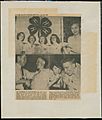4-H facts for kids
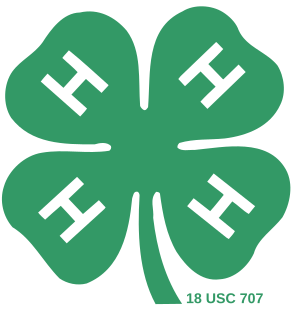
Official 4-H emblem
|
|
| Motto | "To make the best better." |
|---|---|
| Formation | Circa 1902 |
| Type | Youth organization |
| Legal status | Non-profit organization |
| Purpose | "Engaging youth to reach their fullest potential while advancing the field of youth development." |
| Headquarters | Chevy Chase, Maryland |
|
Region served
|
Worldwide |
|
Membership
|
6.5 million members in the United States, ages 5 to 21 |
|
Main organ
|
National Institute of Food and Agriculture (NIFA) |
|
Parent organization
|
United States Department of Agriculture (USDA) |
| Website | 4-H.org |
4-H is a special club for young people in the United States. It is run by the United States Department of Agriculture (USDA). The main goal of 4-H is to help kids and teens grow into their best selves.
The name 4-H stands for four important areas of personal growth: Head, Heart, Hands, and Health. There are over 6.5 million members in the U.S., from ages five to 19. They are part of about 90,000 clubs across the country.
4-H helps young people learn to be good citizens and leaders. It teaches them to be responsible and gain important life skills. They learn by doing fun, hands-on activities. While 4-H started with farming, today it also focuses on science, engineering, technology, and healthy living.
You can find 4-H and similar programs in more than 80 countries around the world. Each country runs its own program. However, they often work together on international projects and learning programs.
The motto for 4-H is "To make the best better." Their slogan is "Learn by doing."
How Did 4-H Start?
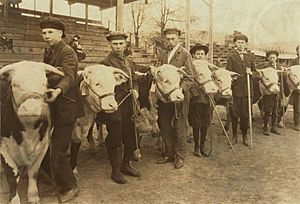
The idea for 4-H began around 1900. Several people in different parts of the U.S. wanted to make school learning more practical. They wanted to connect it to everyday life, especially for kids in rural areas.
At that time, researchers found something interesting. Adult farmers were slow to try new farming ideas. But young people were often willing to experiment with new methods. When kids had success, they would share their experiences with adults. This made youth programs a great way to introduce new farming technology.
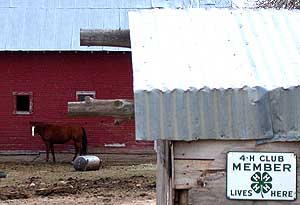
One of the first youth programs was started by A. B. Graham in Ohio in 1902. This is often seen as the start of 4-H in the U.S. His first clubs were called "The Tomato Club" or the "Corn Growing Club." Around the same time, T.A. "Dad" Erickson started similar clubs in Minnesota.
In 1910, Jessie Field Shambaugh created the clover pin with an H on each leaf. By 1912, these groups were known as 4-H clubs. The national 4-H organization was officially formed in 1914. This happened when the U.S. Congress created the Cooperative Extension Service. This service included the work of various boys' and girls' clubs focused on farming and home skills. By 1924, these clubs were fully organized as 4-H clubs, and the clover emblem became official.
The very first 4-H camp was held in Randolph County, West Virginia. These camps were originally for "Corn Clubs." Campers would sleep in corn fields and work most of the day.
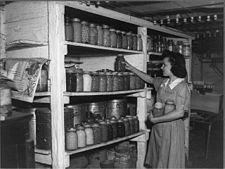
4-H membership reached its highest number in 1974. This was thanks to a popular TV show and educational program called Mulligan Stew. It taught about nutrition and was shown in schools and on TV across the country.
Images for kids
-
4-H Home demonstration agents in Florida in 1933
-
4-H emblem in Oldham County in Vega west of Amarillo, Texas
See also
 In Spanish: 4-H para niños
In Spanish: 4-H para niños



